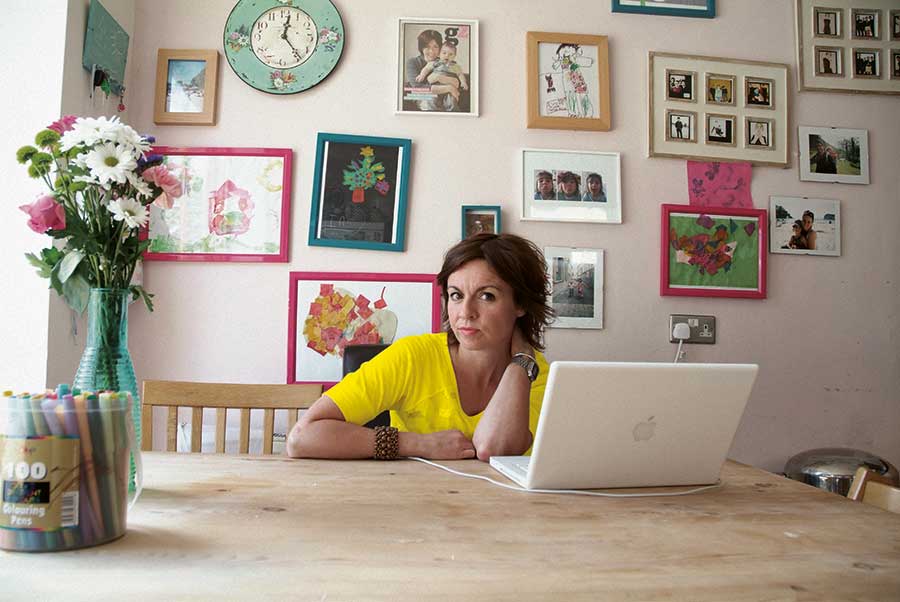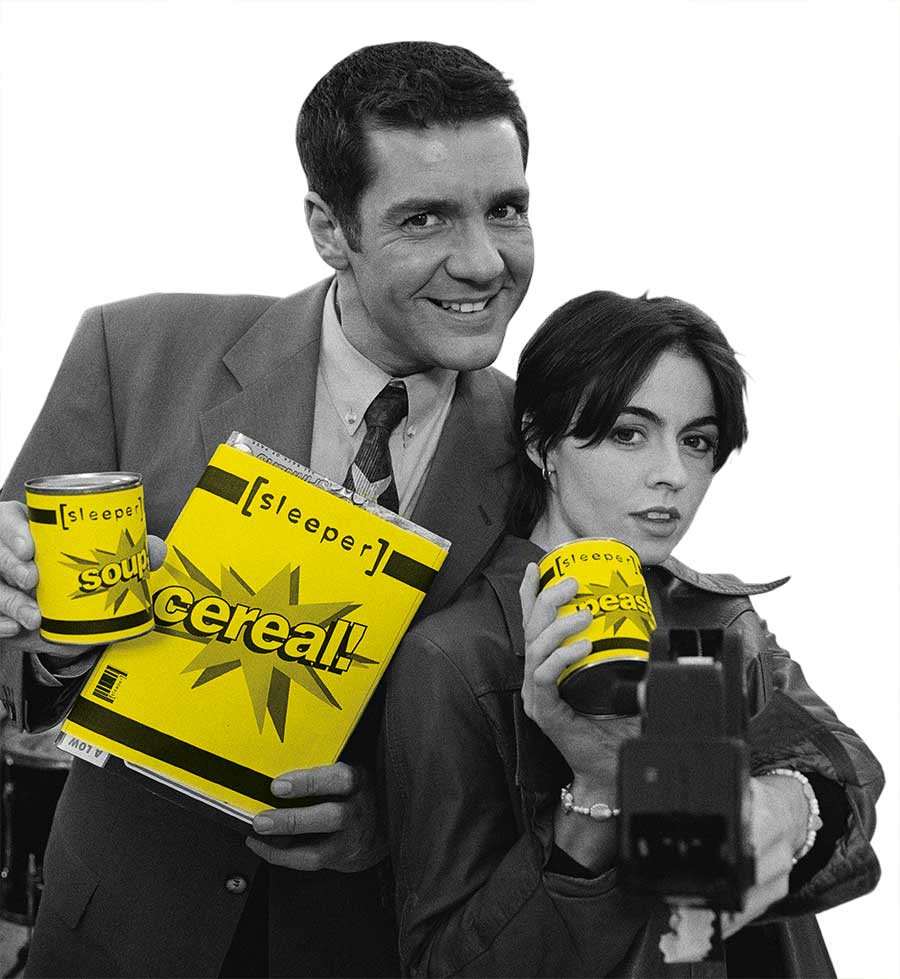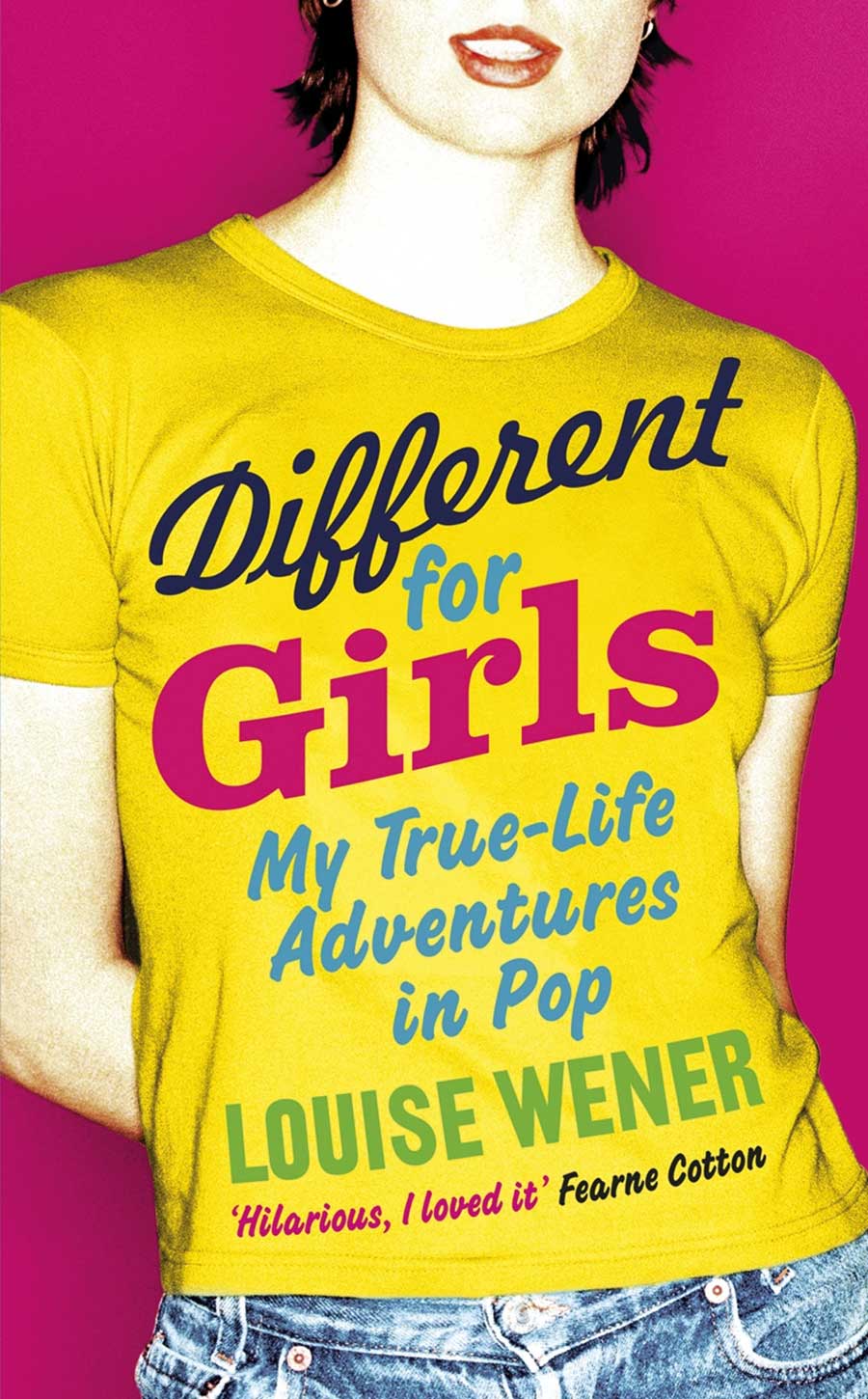
© michaelvenning.com
In 2017, Louise Wener performed with her old band Sleeper for the first time in 20 years. Laura K Williams talked to the Britpop veteran about how it felt strapping on that guitar once again…
A Sleeper reunion was far from inevitable. While the one time ‘Queen of Britpop’ Louise Wener shares her Brighton home with her bandmate husband Andy Maclure, a stone’s throw away from guitarist Jon Stewart’s home, they’ve all been focused on new projects.
Since the band split in 1998, both Andy and Jon have been teaching at the Brighton Institute of Modern Music (BIMM) and making music with the likes of Mel C and Sophie Ellis-Bextor, while Louise has carved out a career as a successful writer, both of fiction and non-fiction.
But when Louise was approached by the organisers of Star Shaped Festival to play alongside some of her 90s peers at an authentic celebration of Britpop, she decided to revisit this somewhat lost part of her life.
“It’s almost like reaching back and taking ownership of your past,” says Louise. “It’s not been part of my life for so long, I’ve almost lost touch with it and forgotten about it like it was some crazy gap year I had in my 20s or something, even though it was longer than that, so it’s nice to reach back and connect with that.
“It feels a little bit brilliant, I have to say. People can be somewhat critical of nostalgia, like if you hark back at things you can’t always look forward at the same time. The two are in conflict in some way. But I think it’s lovely to reach back and reconnect with that part of you.
“We’ve all done different things since and it’s not like we’re going to go back and have it take over our lives again, it’s something we want to do for the pure joy of it.”
The group (minus bassist Diid Osman who lives in Bristol), has been doing a couple of small rehearsals each week ahead of the summer shows and Classic Pop catches Louise the day after the band completed its first full-scale run-through, which doesn’t come without its problems.
“The challenge is remembering it all,” says Louise. “It felt quite alien at first but it passed quite quickly and I’m just trying to form my fingers back into the chord shapes because I haven’t played guitar for years.
“That feels quite awkward, then you have this muscle memory that kicks in and you think ‘God, I remember those’. I stumble over the lyrics a little bit and I’m hoping the crowd will be more on it than me.
“If I mess up they’ll let me know, ‘that’s not how the chorus to Inbetweener goes!’ I hope that’ll work if I muck it up.
“Andy has carried on playing ever since, he’s been in and out of various bands, for him getting up to scratch was not a big deal at all. He was like ‘I can play a gig tomorrow, that’s fine’, it’s the rest of us who’ve had to pull ourselves together and get back into it,” says Louise referring to her drummer husband and father of their two children.
“We’ve not worked together for years and years and years. We’ve gone off and had separate careers so this is actually quite nice. We get a babysitter and go out and rehearse – it’s a night out for us, date night!”
The pop kids
Asked if her children are equally as excited about the Sleeper reunion, she says: “I think they’re just totally not into it. Like: ‘Oh yeah, mum was in a band once, whatever’.
“They’re just not interested in it in that way, but that’s how it should be, you should always find your parents a bit embarrassing.
“My daughter is into a lot of pop music and I appreciate that because that was part of my life growing up, too. My son likes to listen to London Calling, that’s his favourite song but he also likes crazy 80s Bon Jovi.
“Children judge it in a really visceral ‘do I love it, or do I not love it?’ way – there’s a purity in their experience, rather than whinging about what’s cool. I think the ‘what’s cool’ comes later, mid- to late-teens. Much more tribal, what you like says something about you and feeds into what you wear. At that young age, it’s pure response.”

Louise Wener of Sleeper with Dale Winton
And at the height of Sleeper’s fame, Louise realised a lifelong dream – to present an episode of Top Of The Pops, the show that had been so integral to her life as a pop-obsessed teenager. She recalls Supergrass and Lush playing and an incident with the Walrus of Love, Barry White.
“I couldn’t believe I was doing it,” she says. “It was really fun. I remember meeting Barry White and he made us put our hands on his chest while he sung so we could feel the vibrations of him singing.
“The thing about TOTP and the BBC is it’s so old school, people pushing tea trolleys around in contrast with the perceived glamour of it. There’s a certain sort of English ordinariness about it, which I really liked. The idea that I presented it is extraordinary really.
“I remember seeing that Bowie performance of Ashes to Ashes. It was really like watching an alien being – the idea that we could be something so other-worldly – it was beamed into your suburban front room with beige walls and ordinariness and here was this flamboyant butterfly of a human being.
“That was really influential. And I remember seeing Wham do Wham Rap! and that was really great.”
A few years after Sleeper disbanded, Louise wound up in a recording studio with another late, great pop icon of hers, George Michael.
The recordings are yet to see the light of day, but Louise hints that they may well do. She says: “Andy and I had a bunch of solo tracks because we were going to make a solo album that never happened and we recorded in George Michael’s little studio in Highgate.
“He would come in and out and he sang some backing vocals on a song that we were recording, he edited my vocals and played a bit of bass on it. He was lovely and gossipy and everything you’d hope he’d be, generous and friendly, a very sweet guy.
“He was somebody who just got involved and hung out and chatted and told gossipy stories about Elton John – which was really great. It’s that mixture of ordinariness and greatness.”
Cool Britannia
Sleeper were one of the key players in the Britpop movement, with dancefloor-filling tunes such as Inbetweener, What Do I Do Now? and Sale of the Century, they blended catchy pop with a winning mix of melancholy and optimism to create anthems for teenagers up and down the country.
But lifelong pop fan Louise explains how difficult it was to be thrust into the world of indie as ‘Cool Britannia’ took hold.
“I found it very difficult moving into an indie arena and you’re suddenly in the context of being interviewed by the music press where you weren’t allowed to like pop music,” she says.
“If you’d have mentioned you liked Bananarama, it would’ve been something inconstruable to them. It was a very male environment and they hadn’t danced at a disco to Bananarama in a scout hut, which is what I did and it felt glorious.
“To not understand that fantasticness of pop music to young women especially is kind of upsetting. Music’s about escapism and joy, to try to put some sort of lid on that is ridiculous.”
As the title suggests, Louise’s book, Different for Girls: My True-Life Adventures in Pop, explores this further. “Looking back, I feel that the women of that era were judged and caricatured more than the guys in bands were,” she says.
“I would be at interviews and they’d ask the guys how they wrote the songs; there was just this assumption that I didn’t really contribute to the band even though I was the songwriter.
“Women were put under the microscope in the ways the guys weren’t, because there were so few of us so we were watched and analysed and talked about differently.
“There was this sense at the time that we almost had to be androgynous and put our leather jackets and big boots on to be taken seriously; and that was amazing, it took things forward in a way that needed doing, but there was definitely a sense that we had to behave in a certain way, you know the whole ladette movement, and there was a sense that we were ‘apprentice blokes’ rather than a movement in our own right. That was taken away from us.
“The genesis was the whole Riot grrrl movement and then the Britpop movement came along and they took elements of that and it became Natalie Imbruglia somehow, like all the rough edges were taken off of her. I’ve never lost that love of girls standing up and playing loud music on guitars, it’s a slightly revolutionary act in that sense.”
Louise was hailed as a Britpop pin-up, featuring regularly in the NME and Melody Maker’s ‘Sexiest Women’ polls and making skinny indie boys from Bournemouth to Belfast go weak at the knees but how does the now 50-year-old feel about this?
“I wish I’d revelled in it more in retrospect,” she admits, “now I’m old and falling apart. The idea that we can’t take compliments and revel in our beauty during the most beautiful time of our life seems absolute nonsense to me. It’s like beauty is something that’s thrust upon women, something they have to adhere to.
“But we’ve got it, it’s our superpower. It belongs to us and we should take ownership of it. I think that women are understanding that and grappling with it and I think that women who’ve come through feminism in a different way can’t understand it or see that that’s what they’re doing.
“I couldn’t understand why I felt so conflicted about it at the time, I feel much simpler about it now and wish I’d revelled in it.”
The big Britpop swindle
Sleeper signed to Indolent Records in 1993. To many, it seemed like a legit indie label, but it was really a subsidiary of RCA Records and BMG, home to several ‘indie’ bands at the time including The Wannadies, Duffy and 60Ft. Dolls.
Louise dubs this a ‘sham’, saying: “We were always on a major label – the indie label was a pretend indie, like many of them were. There was this thing that you couldn’t be cool if you were on a major label so we were on an indie run through a major and that was true for most Britpop bands.

Louise Wener of Sleeper ©michaelvenning.com
“It became this thing, in the same way you weren’t allowed to like pop music, you also weren’t really supposed to like major labels even though, ultimately, it was a major label paying your advances; so it was a complete sham really, a conspiracy among all those bands to pretend they were indies when all were really financed through BMG or Sony or whoever it was at the time.
“For me, it was hypocrisy – putting labels on music – there’s good music and there’s bad music and I don’t care what genre you describe it as. You’re making music and you’re making money out of it, the same as everyone else.
“All these bands that would go around saying ‘oh I don’t care about money, I don’t care about chart position’ and you knew that they were sitting there waiting for their manager to call with their midweeks and they were insanely competitive with one another. Looking back on it, it was ridiculous. I don’t miss any of that stuff.”
Sleeper are currently down to play the four Star Shaped dates, with nothing else in the pipeline at present. And while they’ve not ruled out more gigs or even writing new material, it’s not at the forefront of their thinking.
“This is something we wanted to do for the pure fun of it,” says Louise. “A celebration.” Asked whether she’ll be wearing the famous ‘Another girl fronted band’ tee, Louise reveals: “I’d love to get into it, but I’m not sure I could. I might be a bit past crop tops now, or not, we will see.”
- Want more from Classic Pop magazine? Get a free digital issue when you sign up to our newsletter!
Classic Pop may earn commission from the links on this page, but we only feature products we think you will enjoy.



